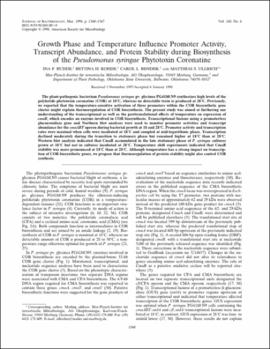| dc.contributor.author | Budde, Ina P. | |
| dc.contributor.author | Rohde, Bettina H. | |
| dc.contributor.author | Bender, Carol L. | |
| dc.contributor.author | Ullrich, Matthias S. | |
| dc.date.accessioned | 2015-10-16T20:47:42Z | |
| dc.date.available | 2015-10-16T20:47:42Z | |
| dc.date.issued | 1998-03 | |
| dc.identifier | okds_Bender_JB_1998-03.pdf | |
| dc.identifier.citation | Budde, I. P., Rohde, B. H., Bender, C. L., & Ullrich, M. S. (1998). Growth phase and temperature influence promoter activity, transcript abundance, and protein stability during biosynthesis of the Pseudomonas syringae phytotoxin coronatine. Journal of Bacteriology, 180(6), 1360-1367. https://doi.org/10.1128/JB.180.6.1360-1367.1998 | |
| dc.identifier.uri | https://hdl.handle.net/11244/19768 | |
| dc.description.abstract | The plant-pathogenic bacterium Pseudomonas syringae pv. glycinea PG4180.N9 synthesizes high levels of the polyketide phytotoxin coronatine (COR) at 18°C, whereas no detectable toxin is produced at 28°C. Previously, we reported that the temperature-sensitive activation of three promoters within the COR biosynthetic gene cluster might explain thermoregulation of COR biosynthesis. The present study was aimed at furthering our understanding of the transcriptional as well as the posttranslational effects of temperature on expression ofcmaB, which encodes an enzyme involved in COR biosynthesis. Transcriptional fusions using a promoterless glucuronidase gene and Northern blot analyses were used to monitor promoter activities and transcript abundance for the cmaABT operon during bacterial growth at 18 and 28°C. Promoter activity and transcription rates were maximal when cells were incubated at 18°C and sampled at mid-logarithmic phase. Transcription declined moderately during the transition to stationary phase but remained higher at 18°C than at 28°C. Western blot analysis indicated that CmaB accumulated in the late stationary phase of P. syringae cultures grown at 18°C but not in cultures incubated at 28°C. Temperature shift experiments indicated that CmaB stability was more pronounced at 18°C than at 28°C. Although temperature has a strong impact on transcription of COR biosynthetic genes, we propose that thermoregulation of protein stability might also control COR synthesis. | |
| dc.format | application/pdf | |
| dc.language | en_US | |
| dc.publisher | American Society for Microbiology | |
| dc.rights | This material has been previously published. In the Oklahoma State University Library's institutional repository this version is made available through the open access principles and the terms of agreement/consent between the author(s) and the publisher. The permission policy on the use, reproduction or distribution of the material falls under fair use for educational, scholarship, and research purposes. Contact Digital Resources and Discovery Services at lib-dls@okstate.edu or 405-744-9161 for further information. | |
| dc.title | Growth phase and temperature influence promoter activity, transcript abundance, and protein stability during biosynthesis of the Pseudomonas syringae phytotoxin coronatine | |
| osu.filename | okds_Bender_JB_1998-03.pdf | |
| dc.description.peerreview | Peer reviewed | |
| dc.identifier.doi | 10.1128/JB.180.6.1360-1367.1998 | |
| dc.description.department | Plant Pathology | |
| dc.type.genre | Article | |
| dc.type.material | Text | |
